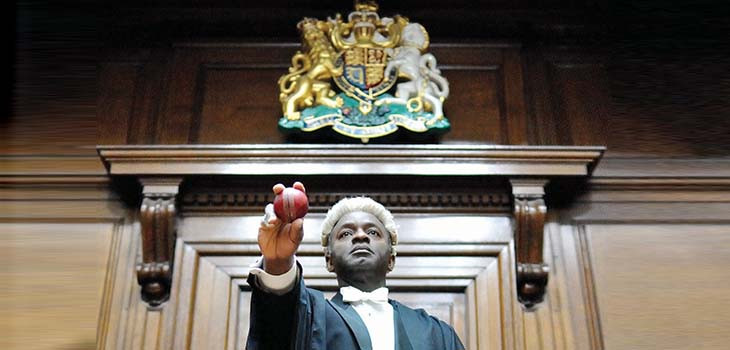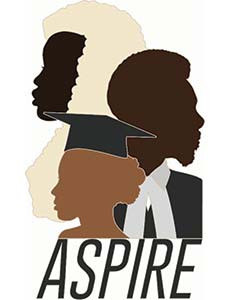*/

‘How do you say your name?’
‘Olatunji Sowande, Sir... Or lah toon gee Show wahn day.’
‘That’s a rather difficult name to pronounce, isn’t it? Why don’t you use a good English name like the West Indians do?’
‘But that’s my name, sir. It’s the name I was christened with. I … ’
‘How are my clients supposed to react when I tell them I’m sending a junior along with a brief, and that he is called Mr Toomba Toomba Shomba Goomba? They’ll know I’m sending an African, will they not? What wil l that say about us, huh?’
Pupil recruitment practice may have improved since this example in the 1950s but the challenge to increase diversity in our profession remains. Fortunately, Tunji Sowande’s unsettling first encounter with chambers did not foreshadow the journey that saw him appointed Britain’s first Black judge in 1978.
On 17 October 2022, ASPIRE will host a performance of Just an Ordinary Lawyer, written and performed by Tayo Aluko, at Birmingham’s Repertory Theatre. The play charts Sowande’s life from his birth in Nigeria, arrival in England in 1945, call to the Bar at Lincoln’s Inn in 1952 to tenancy at 3 King’s Bench Walk. It takes us through his career at the Criminal Bar, conducting important cases at the Old Bailey and beyond, culminating in his appointment as head of chambers and Deputy Circuit Judge.
He never attained silk but selflessly gave his support to many who followed him, including a young Kim Hollis who went on to become a prominent Asian silk. He had a lifelong love of cricket and jazz, and a boundless, generous personality.
Just an Ordinary Lawyer is a moving retrospective of an extraordinary life lived through extraordinary times. Sowande encountered much prejudice and discrimination and made significant personal sacrifice. But his story serves to inspire.
ASPIRE is an affiliation of partner organisations with a joint mission to improve the visibility and advancement of Black lawyers, aiming to make their presence an ever-increasing norm.
Black people face numerous challenges in seeking to break into and progress through the profession. Low numbers apply because of a perception that it is a club for their white, male counterparts. Those who do manage to join often operate on its fringes and have high attrition rates. Many leave owing to the expense of the Bar course, high living costs (especially in London) and the savage cuts to publicly funded cases.
Of those who do remain, few become silks or judges. Recent research reveals that there have been around 2,000 applications for KC in the past decade. Of that number, half were appointed. Just 200-odd of those 2,000 were applications by members of the Black and minority communities. Drilling down further, only 1.2% of the 200 were Black. Research has revealed that recommendation rates for applications for judicial office were 73% lower for Black candidates when compared to white candidates. Much needs to be done to tackle these problems.
The event begins with a networking reception to facilitate a range of connections: young students with young lawyers, practitioners gaining insights from senior members of the profession. Significantly, members of the judiciary will attend to better understand the challenges faced and to encourage applications for judicial office. Judges, barristers, solicitors and students will mix in a friendly, convivial setting, striking up relationships that may lead on to work experience and judicial shadowing. After the performance, there will be a Q&A session, and the networking will continue.
ASPIRE encourages barristers of all backgrounds to attend to see Sowande’s story and help those seeking to join and progress through our hallowed profession.

ASPIRE is an affiliation of partner organisations with a joint mission to make the presence of Black lawyers an ever-increasing norm.
Pictured top: At Birmingham’s Repertory Theatre on 17 October 2022, ASPIRE – in conjunction with No5 Chambers and Birmingham Law Society – hosted a performance of Just an Ordinary Lawyer, the story of Tunji Sowande (1912-1996) written and performed by Tayo Aluko

‘How do you say your name?’
‘Olatunji Sowande, Sir... Or lah toon gee Show wahn day.’
‘That’s a rather difficult name to pronounce, isn’t it? Why don’t you use a good English name like the West Indians do?’
‘But that’s my name, sir. It’s the name I was christened with. I … ’
‘How are my clients supposed to react when I tell them I’m sending a junior along with a brief, and that he is called Mr Toomba Toomba Shomba Goomba? They’ll know I’m sending an African, will they not? What wil l that say about us, huh?’
Pupil recruitment practice may have improved since this example in the 1950s but the challenge to increase diversity in our profession remains. Fortunately, Tunji Sowande’s unsettling first encounter with chambers did not foreshadow the journey that saw him appointed Britain’s first Black judge in 1978.
On 17 October 2022, ASPIRE will host a performance of Just an Ordinary Lawyer, written and performed by Tayo Aluko, at Birmingham’s Repertory Theatre. The play charts Sowande’s life from his birth in Nigeria, arrival in England in 1945, call to the Bar at Lincoln’s Inn in 1952 to tenancy at 3 King’s Bench Walk. It takes us through his career at the Criminal Bar, conducting important cases at the Old Bailey and beyond, culminating in his appointment as head of chambers and Deputy Circuit Judge.
He never attained silk but selflessly gave his support to many who followed him, including a young Kim Hollis who went on to become a prominent Asian silk. He had a lifelong love of cricket and jazz, and a boundless, generous personality.
Just an Ordinary Lawyer is a moving retrospective of an extraordinary life lived through extraordinary times. Sowande encountered much prejudice and discrimination and made significant personal sacrifice. But his story serves to inspire.
ASPIRE is an affiliation of partner organisations with a joint mission to improve the visibility and advancement of Black lawyers, aiming to make their presence an ever-increasing norm.
Black people face numerous challenges in seeking to break into and progress through the profession. Low numbers apply because of a perception that it is a club for their white, male counterparts. Those who do manage to join often operate on its fringes and have high attrition rates. Many leave owing to the expense of the Bar course, high living costs (especially in London) and the savage cuts to publicly funded cases.
Of those who do remain, few become silks or judges. Recent research reveals that there have been around 2,000 applications for KC in the past decade. Of that number, half were appointed. Just 200-odd of those 2,000 were applications by members of the Black and minority communities. Drilling down further, only 1.2% of the 200 were Black. Research has revealed that recommendation rates for applications for judicial office were 73% lower for Black candidates when compared to white candidates. Much needs to be done to tackle these problems.
The event begins with a networking reception to facilitate a range of connections: young students with young lawyers, practitioners gaining insights from senior members of the profession. Significantly, members of the judiciary will attend to better understand the challenges faced and to encourage applications for judicial office. Judges, barristers, solicitors and students will mix in a friendly, convivial setting, striking up relationships that may lead on to work experience and judicial shadowing. After the performance, there will be a Q&A session, and the networking will continue.
ASPIRE encourages barristers of all backgrounds to attend to see Sowande’s story and help those seeking to join and progress through our hallowed profession.

ASPIRE is an affiliation of partner organisations with a joint mission to make the presence of Black lawyers an ever-increasing norm.
Pictured top: At Birmingham’s Repertory Theatre on 17 October 2022, ASPIRE – in conjunction with No5 Chambers and Birmingham Law Society – hosted a performance of Just an Ordinary Lawyer, the story of Tunji Sowande (1912-1996) written and performed by Tayo Aluko


The Chair of the Bar sets out how the new government can restore the justice system
In the first of a new series, Louise Crush of Westgate Wealth considers the fundamental need for financial protection
Unlocking your aged debt to fund your tax in one easy step. By Philip N Bristow
Possibly, but many barristers are glad he did…
Mental health charity Mind BWW has received a £500 donation from drug, alcohol and DNA testing laboratory, AlphaBiolabs as part of its Giving Back campaign
The Institute of Neurotechnology & Law is thrilled to announce its inaugural essay competition
How to navigate open source evidence in an era of deepfakes. By Professor Yvonne McDermott Rees and Professor Alexa Koenig
Brie Stevens-Hoare KC and Lyndsey de Mestre KC take a look at the difficulties women encounter during the menopause, and offer some practical tips for individuals and chambers to make things easier
Sir Geoffrey Vos, Master of the Rolls and Head of Civil Justice since January 2021, is well known for his passion for access to justice and all things digital. Perhaps less widely known is the driven personality and wanderlust that lies behind this, as Anthony Inglese CB discovers
The Chair of the Bar sets out how the new government can restore the justice system
No-one should have to live in sub-standard accommodation, says Antony Hodari Solicitors. We are tackling the problem of bad housing with a two-pronged approach and act on behalf of tenants in both the civil and criminal courts